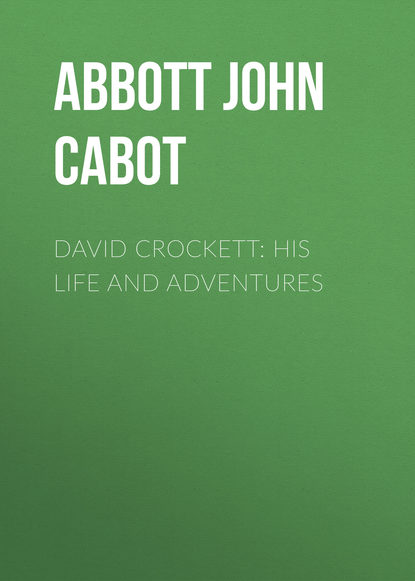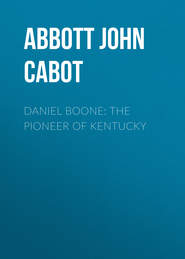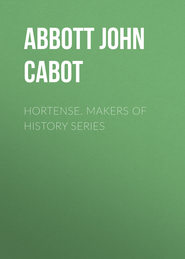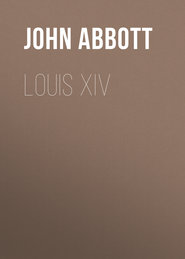По всем вопросам обращайтесь на: info@litportal.ru
(©) 2003-2024.
✖
David Crockett: His Life and Adventures
Настройки чтения
Размер шрифта
Высота строк
Поля
David inquired if he could remain all night. Being answered in the affirmative, he took a seat in a corner and remained perfectly silent, gazing upon the familiar scene, and watching the movements of his father, mother, and sisters. At length supper was ready, and all took seats at the table. As David came more into the light, one of his sisters, observing him, was struck with his resemblance to her lost brother. Fixing her eyes upon him, she, in a moment, rushed forward and threw her arms around his neck, exclaiming, "Here is my brother David."
Quite a scene ensued. The returning prodigal was received with as much affection as could be expected in a family with such uncultivated hearts and such unrefined habits as were found in the cabin of John Crockett. Even the stern old man forgot his hickory switch, and David, much to his relief, found that he should escape the long-dreaded whipping. Many years after this, when David Crockett, to his own surprise, and that of the whole nation, found himself elevated to the position of one of our national legislators, he wrote:
"But it will be a source of astonishment to many, who reflect that I am now a member of the American Congress, the most enlightened body of men in the world, that, at so advanced an age, the age of fifteen, I did not know the first letter in the book."
By the laws and customs of our land, David was bound to obey his father and work for him until he was twenty-one years of age. Until that time, whatever wages he might earn belonged to his father. It is often an act of great generosity for a hard-working farmer to release a stout lad of eighteen or nineteen from this obligation, and "to give him," as it is phrased, "his time."
John Crockett owed a neighbor, Abraham Wilson, thirty-six dollars. He told David that if he would work for Mr. Wilson until his wages paid that sum, he would then release him from all his obligations to his father, and his son might go free. It was a shrewd bargain for the old man, for he had already learned that David was abundantly capable of taking care of himself, and that he would come and go when and where he pleased.
The boy, weary of his wanderings, consented to the arrangement, and engaged to work for Mr. Wilson for six months, in payment for which, the note was to be delivered up to his father. It was characteristic of David that whatever he undertook he engaged in with all his might. He was a rude, coarse boy. It was scarcely possible, with his past training, that he should be otherwise. But he was very faithful in fulfilling his obligations. Though his sense of right and wrong was very obtuse, he was still disposed to do the right so far as his uncultivated conscience revealed it to him.
For six months, David worked for Mr. Wilson with the utmost fidelity and zeal. He then received the note, presented it to his father, and, before he was sixteen years of age, stood up proudly his own man. His father had no longer the right to whip him. His father had no longer the right to call upon him for any service without paying him for it. And on the other hand, he could no longer look to his father for food or clothing. This thought gave him no trouble. He had already taken care of himself for two years, and he felt no more solicitude in regard to the future than did the buffalo's calf or the wolf's whelp.
Wilson was a bad man, dissipated and unprincipled. But he had found David to be so valuable a laborer that he offered him high wages if he would remain and work for him. It shows a latent, underlying principle of goodness in David, that he should have refused the offer. He writes:
"The reason was, it was a place where a heap of bad company met to drink and gamble; and I wanted to get away from them, for I know'd very well, if I staid there, I should get a bad name, as nobody could be respectable that would live there."
About this time a Quaker, somewhat advanced in years, a good, honest man, by the name of John Kennedy, emigrated from North Carolina, and selecting his four hundred acres of land about fifteen miles from John Crockett's, reared a log hut and commenced a clearing. In some transaction with Crockett he took his neighbor's note for forty dollars. He chanced to see David, a stout lad of prepossessing appearance, and proposed that he should work for him for two shillings a day taking him one week upon trial. At the close of the week the Quaker expressed himself as highly satisfied with his work, and offered to pay him with his father's note of forty dollars for six months' labor on his farm.
David knew full well how ready his father was to give his note, and how slow he was to pay it. He was fully aware that the note was not worth, to him, the paper upon which it was written. But he reflected that the note was an obligation upon his father, that he was very poor, and his lot in life was hard. It certainly indicated much innate nobility of nature that this boy, under these circumstances, should have accepted the offer of the Quaker. But David did this. For six months he labored assiduously, without the slightest hope of reward, excepting that he would thus relieve his father, whom he had no great cause either to respect or love, from the embarrassment of the debt.
For a whole half-year David toiled upon the farm of the Quaker, never once during that time visiting his home. At the end of the term he received his pay for those long months of labor, in a little piece of rumpled paper, upon which his father had probably made his mark. It was Saturday evening. The next morning he borrowed a horse of his employer and set out for a visit home. He was kindly welcomed. His father knew nothing of the agreement which his son had made with Mr. Kennedy. As the family were talking together around the cabin fire, David drew the note from his pocket and presented it to his father. The old man seemed much troubled. He supposed Mr. Kennedy had sent it for collection. As usual, he began to make excuses. He said that he was very sorry that he could not pay it, that he had met with many misfortunes, that he had no money, and that he did not know what to do.
David then told his father that he did not hand him the bill for collection, but that it was a present from him—that he had paid it in full. It is easy for old and broken-down men to weep. John Crockett seemed much affected by this generosity of his son, and David says "he shed a heap of tears." He, however, avowed his inability to pay anything whatever, upon the note.
David had now worked a year without getting any money for himself. His clothes were worn out, and altogether he was in a very dilapidated condition. He went back to the Quaker's, and again engaged in his service, desiring to earn some money to purchase clothes. Two months thus passed away. Every ardent, impetuous boy must have a love adventure. David had his. A very pretty young Quakeress, of about David's age, came from North Carolina to visit Mr. Kennedy, who was her uncle. David fell desperately in love with her. We cannot better describe this adventure than in the unpolished diction of this illiterate boy. If one would understand this extraordinary character, it is necessary thus to catch such glimpses as we can of his inner life. Let this necessity atone for the unpleasant rudeness of speech. Be it remembered that this reminiscence was written after David Crockett was a member of Congress.
"I soon found myself head over heels in love with this girl. I thought that if all the hills about there were pure chink, and all belonged to me, I would give them if I could just talk to her as I wanted to. But I was afraid to begin; for when I would think of saying anything to her, my heart would begin to flutter like a duck in a puddle. And if I tried to outdo it and speak, it would get right smack up in my throat, and choke me like a cold potato. It bore on my mind in this way, till at last I concluded I must die if I didn't broach the subject. So I determined to begin and hang on a-trying to speak, till my heart would get out of my throat one way or t'other.
"And so one day at it I went, and after several trials I could say a little. I told her how I loved her; that she was the darling object of my soul and body, and I must have her, or else I should pine down to nothing, and just die away with consumption.
"I found my talk was not disagreeable to her. But she was an honest girl, and didn't want to deceive nobody. She told me she was engaged to her cousin, a son of the old Quaker. This news was worse to me than war, pestilence, or famine. But still I know'd I could not help myself. I saw quick enough my cake was dough; and I tried to cool off as fast as possible. But I had hardly safety pipes enough, as my love was so hot as mighty nigh to burst my boilers. But I didn't press my claims any more, seeing there was no chance to do anything."
David's grief was very sincere, and continued as long as is usually the case with disappointed lovers.
David soon began to cherish some slight idea of the deficiency in his education. He had never been to school but four days; and in that time he had learned absolutely nothing. A young man, a Quaker, had opened a school about a mile and a half from Mr. Kennedy's. David made an arrangement with his employer by which he was to go to school four days in the week, and work the other two days for his board. He continued in this way for six months. But it was very evident that David was not born for a scholar. At the end of that time he could read a little in the first primer. With difficulty he could make certain hieroglyphics which looked like his name. He could also perform simple sums in addition, subtraction, and multiplication. The mysteries of division he never surmounted.
This was the extent of his education. He left school, and in the laborious life upon which he entered, never after improved any opportunity for mental culture. The disappointment which David had encountered in his love affair, only made him more eager to seek a new object upon which he might fix his affections. Not far from Mr. Kennedy's there was the cabin of a settler, where there were two or three girls. David had occasionally met them. Boy as he was, for he was not yet eighteen, he suddenly and impetuously set out to see if he could not pick, from them, one for a wife.
Without delay he made his choice, and made his offer, and was as promptly accepted as a lover. Though they were both very young, and neither of them had a dollar, still as those considerations would not have influenced David in the slightest degree, we know not why they where not immediately married. Several months of very desperate and satisfactory courtship passed away, when the time came for the nuptials of the little Quaker girl, which ceremony was to take place at the cabin of her uncle David and his "girl" were invited to the wedding. The scene only inflamed the desires of David to hasten his marriage-day. He was very importunate in pressing his claims. She seemed quite reluctant to fix the day, but at last consented; and says David, "I thought if that day come, I should be the happiest man in the created world, or in the moon, or anywhere else."
In the mean time David had become very fond of his rifle, and had raised enough money to buy him one. He was still living with the Quaker. Game was abundant, and the young hunter often brought in valuable supplies of animal food. There were frequent shooting-matches in that region. David, proud of his skill, was fond of attending them. But his Quaker employer considered them a species of gambling, which drew together all the idlers and vagrants of the region, and he could not approve of them.
There was another boy living at that time with the Quaker. They practised all sorts of deceptions to steal away to the shooting-matches under pretence that they were engaged in other things. This boy was quite in love with a sister of David's intended wife. The staid member of the Society of Friends did not approve of the rude courting frolics of those times, which frequently occupied nearly the whole night.
The two boys slept in a garret, in what was called the gable end of the house. There was a small window in their rough apartment. One Sunday, when the Quaker and his wife were absent attending a meeting, the boys cut a long pole, and leaned it up against the side of the house, as high as the window, but so that it would not attract any attention. They were as nimble as catamounts, and could run up and down the pole without the slightest difficulty. They would go to bed at the usual early hour. As soon as all were quiet, they would creep from the house, dressed in their best apparel, and taking the two farm-horses, would mount their backs and ride, as fast as possible, ten miles through the forest road to where the girls lived. They were generally expected. After spending all the hours of the middle of the night in the varied frolics of country courtship, they would again mount their horses and gallop home, being especially careful to creep in at their window before the dawn of day The course of true love seemed for once to be running smoothly. Saturday came, and the next week, on Thursday, David was to be married.
It so happened that there was to be a shooting match on Saturday, at one of the cabins not far from the home of his intended bride. David made some excuse as to the necessity of going home to prepare for his wedding, and in the morning set out early, and directed his steps straight to the shooting-match. Here he was very successful in his shots, and won about five dollars. In great elation of spirits, and fully convinced that he was one of the greatest and happiest men in the world, he pressed on toward the home of his intended bride.
He had walked but a couple of miles, when he reached the cabin of the girl's uncle. Considering the members of the family already as his relatives, he stepped in, very patronizingly, to greet them. He doubted not that they were very proud of the approaching alliance of their niece with so distinguished a man as himself—a man who had actually five dollars, in silver, in his pocket. Entering the cabin, he found a sister of his betrothed there. Instead of greeting him with the cordiality he expected, she seemed greatly embarrassed. David had penetration enough to see that something was wrong. The reception she gave him was not such as he thought a brother-in-law ought to receive. He made more particular inquiries. The result we will give in David's language.
"She then burst into tears, and told me that her sister was going to deceive me; and that she was to be married to another man the next day. This was as sudden to me as a clap of thunder of a bright sunshiny day. It was the capstone of all the afflictions I had ever met with; and it seemed to me that it was more than any human creature could endure. It struck me perfectly speechless for some time, and made me feel so weak that I thought I should sink down. I however recovered from the shock after a little, and rose and started without any ceremony, or even bidding anybody good-bye. The young woman followed me out to the gate, and entreated me to go on to her father's, and said she would go with me.
"She said the young man who was going to marry her sister had got his license and asked for her. But she assured me that her father and mother both preferred me to him; and that she had no doubt that if I would go on I could break off the match. But I found that I could go no farther. My heart was bruised, and my spirits were broken down. So I bid her farewell, and turned my lonesome and miserable steps back again homeward, concluding that I was only born for hardship, misery, and disappointment. I now began to think that in making me it was entirely forgotten to make my mate; that I was born odd, and should always remain so, and that nobody would have me.
"But all these reflections did not satisfy my mind, for I had no peace, day nor night, for several weeks. My appetite failed me, and I grew daily worse and worse. They all thought I was sick; and so I was. And it was the worst kind of sickness, a sickness of the heart, and all the tender parts, produced by disappointed love."
For some time David continued in a state of great dejection, a lovelorn swain of seventeen years. Thus disconsolate, he loved to roam the forest alone, with his rifle as his only companion, brooding over his sorrows. The gloom of the forest was congenial to him, and the excitement of pursuing the game afforded some slight relief to his agitated spirit. One day, when he had wandered far from home, he came upon the cabin of a Dutchman with whom he had formed some previous acquaintance. He had a daughter, who was exceedingly plain in her personal appearance, but who had a very active mind, and was a bright, talkative girl.
She had heard of David's misadventure, and rather unfeelingly rallied him upon his loss. She however endeavored to comfort him by the assurance that there were as good fish in the sea as had ever been caught out of it. David did not believe in this doctrine at all, as applied to his own case, He thought his loss utterly irretrievable. And in his still high appreciation of himself, notwithstanding his deep mortification, he thought that the lively Dutch girl was endeavoring to catch him for her lover. In this, however, he soon found himself mistaken.
She told him that there was to be a reaping frolic in their neighborhood in a few days, and that if he would attend it, she would show him one of the prettiest girls upon whom he ever fixed his eyes. Difficult as he found it to shut out from his mind his lost love, upon whom his thoughts were dwelling by day and by night, he very wisely decided that his best remedy would be found in what Dr. Chalmers calls "the expulsive power of a new affection;" that is, that he would try and fall in love with some other girl as soon as possible. His own language, in describing his feelings at that time, is certainly very different from that which the philosopher or the modern novelist would have used, but it is quite characteristic of the man. The Dutch maiden assured him that the girl who had deceived him was not to be compared in beauty with the one she would show to him. He writes:
"I didn't believe a word of all this, for I had thought that such a piece of flesh and blood as she had never been manufactured, and never would again. I agreed with her that the little varmint had treated me so bad that I ought to forget her, and yet I couldn't do it. I concluded that the best way to accomplish it was to cut out again, and see if I could find any other that would answer me; and so I told the Dutch girl that I would be at the reaping, and would bring as many as I could with me."
David seems at this time to have abandoned all constant industry, and to be loafing about with his rifle, thus supporting himself with the game he took. He traversed the still but slightly broken forest in all directions, carrying to many scattered farm-houses intelligence of the approaching reaping frolic. He informed the good Quaker with whom he had worked of his intention to be there. Mr. Kennedy endeavored to dissuade him. He said that there would be much bad company there; that there would be drinking and carousing, and that David had been so good a boy that he should be very sorry to have him get a bad name.
The curiosity of the impetuous young man was, however, by this time, too much aroused for any persuasions to hold him back. Shouldering his rifle, he hastened to the reaping at the appointed day. Upon his arrival at the place he found a large company already assembled. He looked around for the pretty girl, but she was nowhere to be seen. She chanced to be in a shed frolicking with some others of the young people.
But as David, with his rifle on his shoulder, sauntered around, an aged Irish woman, full of nerve and volubility, caught sight of him. She was the mother of the girl, and had been told of the object of David's visit. He must have appeared very boyish, for he had not yet entered his eighteenth year, and though very wiry and athletic, he was of slender frame, and rather small in stature.
The Irish woman hastened to David; lavished upon him compliments respecting his rosy cheeks, and assured him that she had exactly such a sweet heart for him as he needed. She did not allow, David to have any doubt that she would gladly welcome him as the husband of her daughter.
Pretty soon the young, fresh, blooming, mirthful girl came along; and David fell in love with her at first sight. Not much formality of introduction was necessary: each was looking for the other. Both of the previous loves of the young man were forgotten in an instant. He devoted himself with the utmost assiduity, to the little Irish girl. He was soon dancing with her. After a very vigorous "double shuffle," as they were seated side by side on a bench intensely talking, for David Crockett was never at a loss for words, the mother came up, and, in her wonderfully frank mode of match-making, jocosely addressed him as her son-in-law.
Even David's imperturbable self-possession was disturbed by this assailment. Still he was much pleased to find both mother and daughter so favorably disposed toward him. The rustic frolicking continued nearly all night. In the morning, David, in a very happy frame of mind, returned to the Quaker's, and in anticipation of soon setting up farming for himself, engaged to work for him for six months for a low-priced horse.
CHAPTER III
Marriage and Settlement
Rustic Courtship.—The Rival Lover.—Romantic Incident.—The Purchase of a Horse.—The Wedding.—Singular Ceremonies.—The Termagant.—Bridal Days.—They commence Housekeeping.—The Bridal Mansion and Outfit.—Family Possessions.—The Removal to Central Tennessee.—Mode of Transportation.—The New Home and its Surroundings.—Busy Idleness.—The Third Move.—The Massacre at Fort Mimms.
David took possession of his horse, and began to work very diligently to pay for it. He felt that now he was a man of property. After the lapse of a few weeks he mounted his horse and rode over to the Irishman's cabin to see his girl, and to find out how she lived, and what sort of people composed the family. Arriving at the log hut, he found the father to be a silent, staid old man, and the mother as voluble and nervous a little woman as ever lived. Much to his disappointment, the girl was away. After an hour or two she returned, having been absent at some meeting or merry-making, and, much to his chagrin, she brought back with her a stout young fellow who was evidently her lover.
The new-comer was not at all disposed to relinquish his claims in favor of David Crockett. He stuck close to the maiden, and kept up such an incessant chatter that David could scarcely edge in a word. In characteristic figure of speech he says, "I began to think I was barking up the wrong tree again. But I determined to stand up to my rack, fodder or no fodder." He thought he was sure of the favor of her parents, and he was not certain that the girl herself had not given him sundry glances indicative of her preference. Dark night was now coming on, and David had a rough road of fifteen miles to traverse through the forest before he could reach home. He thought that if the Irishman's daughter cherished any tender feelings toward him, she would be reluctant to have him set out at that late hour on such a journey. He therefore rose to take leave.
His stratagem proved successful. The girl immediately came, leaving her other companion, and in earnest tones entreated him not to go that evening. The lover was easily persuaded. His heart grew lighter and his spirit bolder. She soon made it so manifest in what direction her choice lay, that David was left entire master of the field. His discomfited rival soon took his hat and withdrew, David thus was freed from all his embarrassments.
It was Saturday night. He remained at the cabin until Monday morning, making very diligent improvement of his time in the practice of all those arts of rural courtship which instinct teaches. He then returned home, not absolutely engaged, but with very sanguine hopes.
At that time, in that region, wolves were abundant and very destructive. The neighbors, for quite a distance, combined for a great wolf-hunt, which should explore the forest for many miles. By the hunters thus scattering on the same day, the wolves would have no place of retreat. If they fled before one hunter they would encounter another. Young Crockett, naturally confident, plunged recklessly into the forest, and wandered to and fro until, to his alarm, he found himself bewildered and utterly lost. There were no signs of human habitations near, and night was fast darkening around him.
Just as he was beginning to feel that he must look out for a night's encampment, he saw in the distance, through the gigantic trees, a young girl running at her utmost speed, or, as he expressed it in the Crockett vernacular, "streaking it along through the woods like all wrath." David gave chase, and soon overtook the terrified girl, whom he found, to his surprise and delight, to be his own sweetheart, who had also by some strange accident got lost.
Here was indeed a romantic and somewhat an embarrassing adventure. The situation was, however, by no means so embarrassing as it would have been to persons in a higher state of civilization. The cabin of the emigrant often consisted of but one room, where parents and children and the chance guest passed the night together. They could easily throw up a camp. David with his gun could kindle a fire and get some game. The girl could cook it. All their physical wants would thus be supplied. They had no material inconveniences to dread in camping out for a night. The delicacy of the situation would not be very keenly felt by persons who were at but one remove above the native Indian.
The girl had gone out in the morning into the woods, to hunt up one of her father's horses. She missed her way, became lost, and had been wandering all day long farther and farther from home. Soon after the two met they came across a path which they knew must lead to some house. Following this, just after dark they came within sight of the dim light of a cabin fire. They were kindly received by the inmates, and, tired as they were, they both sat up all night. Upon inquiry they found that David had wandered ten miles from his home, and the young girl seven from hers. Their paths lay in different directions, but the road was plain, and in the morning they separated, and without difficulty reached their destination.











